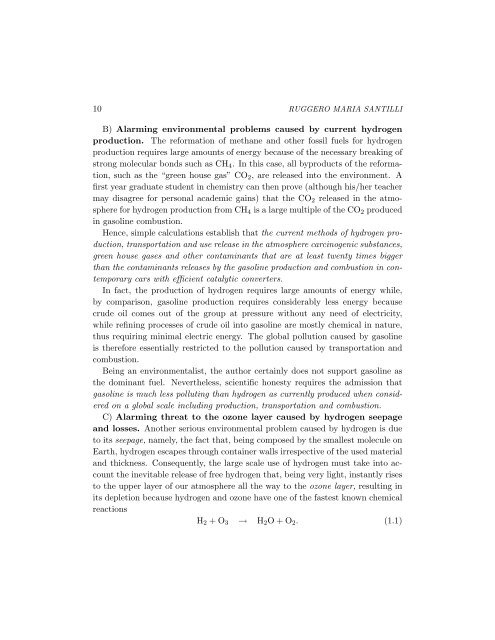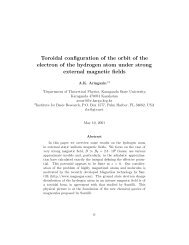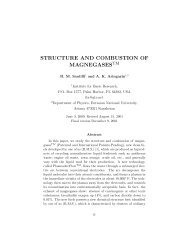the new fuels with magnecular structure - Institute for Basic Research
the new fuels with magnecular structure - Institute for Basic Research
the new fuels with magnecular structure - Institute for Basic Research
You also want an ePaper? Increase the reach of your titles
YUMPU automatically turns print PDFs into web optimized ePapers that Google loves.
10 RUGGERO MARIA SANTILLI<br />
B) Alarming environmental problems caused by current hydrogen<br />
production. The re<strong>for</strong>mation of methane and o<strong>the</strong>r fossil <strong>fuels</strong> <strong>for</strong> hydrogen<br />
production requires large amounts of energy because of <strong>the</strong> necessary breaking of<br />
strong molecular bonds such as CH 4 . In this case, all byproducts of <strong>the</strong> re<strong>for</strong>mation,<br />
such as <strong>the</strong> “green house gas” CO 2 , are released into <strong>the</strong> environment. A<br />
first year graduate student in chemistry can <strong>the</strong>n prove (although his/her teacher<br />
may disagree <strong>for</strong> personal academic gains) that <strong>the</strong> CO 2 released in <strong>the</strong> atmosphere<br />
<strong>for</strong> hydrogen production from CH 4 is a large multiple of <strong>the</strong> CO 2 produced<br />
in gasoline combustion.<br />
Hence, simple calculations establish that <strong>the</strong> current methods of hydrogen production,<br />
transportation and use release in <strong>the</strong> atmosphere carcinogenic substances,<br />
green house gases and o<strong>the</strong>r contaminants that are at least twenty times bigger<br />
than <strong>the</strong> contaminants releases by <strong>the</strong> gasoline production and combustion in contemporary<br />
cars <strong>with</strong> efficient catalytic converters.<br />
In fact, <strong>the</strong> production of hydrogen requires large amounts of energy while,<br />
by comparison, gasoline production requires considerably less energy because<br />
crude oil comes out of <strong>the</strong> group at pressure <strong>with</strong>out any need of electricity,<br />
while refining processes of crude oil into gasoline are mostly chemical in nature,<br />
thus requiring minimal electric energy. The global pollution caused by gasoline<br />
is <strong>the</strong>re<strong>for</strong>e essentially restricted to <strong>the</strong> pollution caused by transportation and<br />
combustion.<br />
Being an environmentalist, <strong>the</strong> author certainly does not support gasoline as<br />
<strong>the</strong> dominant fuel. Never<strong>the</strong>less, scientific honesty requires <strong>the</strong> admission that<br />
gasoline is much less polluting than hydrogen as currently produced when considered<br />
on a global scale including production, transportation and combustion.<br />
C) Alarming threat to <strong>the</strong> ozone layer caused by hydrogen seepage<br />
and losses. Ano<strong>the</strong>r serious environmental problem caused by hydrogen is due<br />
to its seepage, namely, <strong>the</strong> fact that, being composed by <strong>the</strong> smallest molecule on<br />
Earth, hydrogen escapes through container walls irrespective of <strong>the</strong> used material<br />
and thickness. Consequently, <strong>the</strong> large scale use of hydrogen must take into account<br />
<strong>the</strong> inevitable release of free hydrogen that, being very light, instantly rises<br />
to <strong>the</strong> upper layer of our atmosphere all <strong>the</strong> way to <strong>the</strong> ozone layer, resulting in<br />
its depletion because hydrogen and ozone have one of <strong>the</strong> fastest known chemical<br />
reactions<br />
H 2 + O 3 → H 2 O + O 2 . (1.1)














